美国总审计局(GAO)对唐骏母校(加州西太平洋大学)的调查报告
美国州务卿的认证签字及中国领事馆的认证盖章
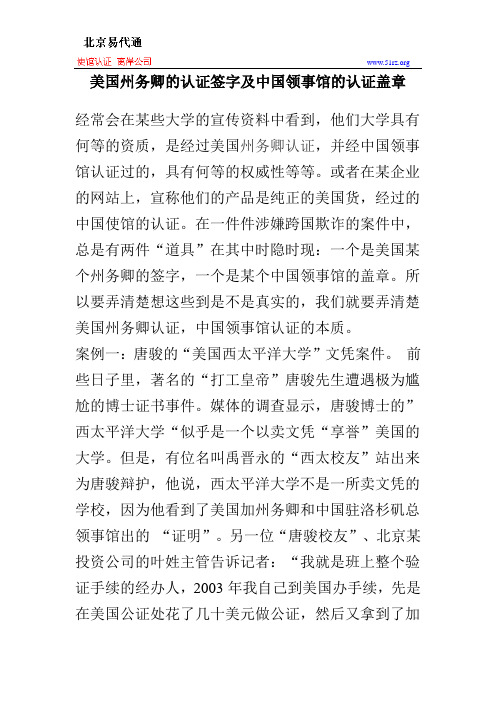
美国州务卿的认证签字及中国领事馆的认证盖章经常会在某些大学的宣传资料中看到,他们大学具有何等的资质,是经过美国州务卿认证,并经中国领事馆认证过的,具有何等的权威性等等。
或者在某企业的网站上,宣称他们的产品是纯正的美国货,经过的中国使馆的认证。
在一件件涉嫌跨国欺诈的案件中,总是有两件“道具”在其中时隐时现:一个是美国某个州务卿的签字,一个是某个中国领事馆的盖章。
所以要弄清楚想这些到是不是真实的,我们就要弄清楚美国州务卿认证,中国领事馆认证的本质。
案例一:唐骏的“美国西太平洋大学”文凭案件。
前些日子里,著名的“打工皇帝”唐骏先生遭遇极为尴尬的博士证书事件。
媒体的调查显示,唐骏博士的”西太平洋大学“似乎是一个以卖文凭“享誉”美国的大学。
但是,有位名叫禹晋永的“西太校友”站出来为唐骏辩护,他说,西太平洋大学不是一所卖文凭的学校,因为他看到了美国加州务卿和中国驻洛杉矶总领事馆出的“证明”。
另一位“唐骏校友”、北京某投资公司的叶姓主管告诉记者:“我就是班上整个验证手续的经办人,2003年我自己到美国办手续,先是在美国公证处花了几十美元做公证,然后又拿到了加州州务卿的签字证明,最后还有加州总领事写的认证。
”案例二; “全球水电工业公司”案件。
据《南方周末》2010年7月8日报道,一家鲜为人知的名叫“全球水电工业公司”的美国企业,2008年底突降中国大陆。
过去两年里,该公司携“太空太阳能”等高科技概念,以动辄数十亿欧元投资作饵,搅动了大半个中国的太阳能行业,成为众多地方政府争相追逐的座上嘉宾。
不过,该公司频频登场的,除了一位金发碧眼的霍华德先生(据说是“美国高干子弟“)以外,其他人都是海外或港台华人。
据媒体调查的迹象表明,该公司大致是个“皮包公司”,明显涉嫌在海内外“做局融资”。
其间,该公司用来迷惑大陆官员的公司证明文件主要是:美国内华达州州务卿的签名,以及中国驻旧金山总领事馆的公章。
人们不免会发生疑问,为什么这些涉嫌虚假的文件上会出现美国州务卿的签字和中国驻美国的领事馆的盖章呢?回答这个问题,我们必须要从根本上了解,美国公证制度与我们中国人通常所理解的公证制度之间,存在着重大区别。
2020高考语文作文素材 唐骏演讲被“踢馆”引发热议

语文:2020高考作文素材:唐骏演讲被“踢馆”引发热议“踢馆”女大学生最可爱4月27日,“打工皇帝”唐骏应邀到南京林业大学作题为《我的成功可以复制》的演讲,遭遇一女大学生“踢馆”。
演讲临近尾声时,这位女大学生拿着一沓“西太平洋大学”的学位证书,邀请唐骏签字,并质问其美国绿卡的由来,这位女大学生说:没有道德的人不应站在高校的讲台上。
(4月30日《扬子晚报》)唐骏以高薪闻名,能获此待遇,说明唐骏很有能力,其成功绝非只靠“西太平洋大学”学位证书帮忙。
但有能力还要有道德,唐骏的“西太平洋大学”学位证书系造假而得一事被曝光后,唐骏不但拒不道歉,而且恬不知耻地说:“你欺骗一个人没问题,如果所有人都被你欺骗到了,就是一种能力,就是成功的标志。
”由此可见,唐骏是一个道德上有严重缺陷者,“踢馆”的女大学生说得好,没有道德的人不应站在高校的讲台上。
我觉得这位女大学生最可爱。
她让唐骏的卑微再次暴露。
请唐骏在“西太平洋大学”学位证书上签字时,这位女大学生说:“我觉得唐骏先生的成功不仅可以复制,还可以复印。
”唐骏回应道:“要签字,我一定会给你签的,最好签在你的身上。
”从两者的对话中,不难看出女大学生的幽默和唐骏的轻佻。
联想到唐骏的拒不道歉和为欺骗行为所作的辩解,我们会看出,每每以成功者身份出现在公众面前的唐骏,高傲姿态下掩藏着内心道德缺陷带来的卑微,女大学生的质问使其卑微再次暴露无遗。
她有着不怕压的勇气。
唐骏是南京林业大学邀请到的客人,而且学校为了防止演讲中出意外,专门作了精心安排。
这位女大学生质问唐骏时,即有人欲上前制止;当其拿着学位复印件要求唐骏签字时,又有人上前抢夺复印件。
对学校的精心安排,她是清楚的,对质问唐骏可能遇到的阻力,她是可以预见的,可她还是坚持自己的做法,这足以显示出其不怕压的勇气和求真务实的精神。
她有着不怕讥讽的坦荡。
有“异动”的人会受到嘲讽,这位女大学生也不例外,她质问唐骏,有人说其是想出名;更有演讲的组织者称其是“没把自己当作一个普通的学生”。
美国西大:唐骏的博士学位是通过远程教育获得的

“西太平洋大学(dàxué)效劳(xiào láo)〞记录(jìlù)部门工作人员阿伦·贝克,在美国当地时间13日就唐骏“学历门〞事件(shìjiàn)向晨报记者发来了一封长信。
在信中,阿伦·贝克证实,唐骏确实(quèshí)是该校学生,同时他也证实西太平洋大学“确实没有教室〞,该校的课程工程都是通过远程或网上教学完成的,因此“唐骏是通过远程教育获得博士学位的〞。
12日,唐骏通过媒体发表“欺骗也是种才能的〞惊人论点,“西太平洋大学效劳〞的表态,也许会成为他的“救命稻草〞。
西太平洋大学确实没教室“我们可以证明唐骏先生于1993年6月入学,于1995年4月完成了博士论文并获得了电子工程博士学位。
〞在给晨报记者的邮件中,“西太平洋大学效劳〞记录部门工作人员阿伦·贝克如此证实。
对于“西太平洋大学在加州西木地区时期,没有校园,只是有一间办公室,与手机租借店共用〞的说法,阿伦·贝克回应称:“西太平洋大学有多个行政办公室,但学校确实没有教室。
因为我们的课程工程都是通过远程或网上教学完成的。
不过,加州法律对这些学校的设施会进展监视,因为对学校进展‘认证’时,这些学校需要符合相关要求。
〞“文凭工厂〞是信息误读在邮件中,阿伦·贝克告诉记者,西太平洋大学加州分校已有近30年的“答应〞史,被称为“文凭工厂〞是不恰当的,“因为西太平洋大学加州分校有加州‘答应’,而这一切使得这个学校不可能成为‘文凭工厂’。
〞阿伦·贝克说,1977年至1996年期间,加州分校已获得加州政府的“受权〞,而1996年时因加州法律变更,它的这种“州受权〞也变为“州答应〞。
“加州分校被指为‘文凭工厂’是信息的误读。
加州政府的‘州受权’和‘州答应’在全美都是成认的。
在二十一世纪初,加州许多学校在开设网上课程之前,获得‘州答应’这一身份是对成人教学质量的一种成认。
某集团的野鸡大学的唐骏出来道歉了!唉!太迟了!

某集团的野鸡大学的唐骏出来道歉了!唉!太迟了!新华都集团总裁兼CEO唐骏,这位被誉为“打工皇帝”的职业经理人,以其传奇般的个人奋斗史激励着无数人,然而两年前“学历门”事件,让其从巅峰猛然跌至低谷。
近日,在搜狐财经举办的《未来大讲堂》关于“超越自我,超越平凡”主题演讲上,唐骏就“学历门”事件进行了详细的陈述,并首度公开道歉。
有媒体评论指出,苦等了两年,“我错了”这句姗姗来迟的道歉,就其内容看,过分强调“自己太高调了,得罪了很多人”,还是有些犹抱琵琶的意味,终究是少了一些主动和坦诚。
负气出走名古屋大学2010年7月,有“打工皇帝”之称的唐骏被卷入“学历门”漩涡,一夜之间由被捧为天上的精英,变为跌入谷底丧失诚信的“造假者”。
面对外界的一片质疑,19日晚,在北大举行的讲座上,新华都集团总裁兼CEO、微软(中国)公司终身荣誉总裁唐骏爆料“学历门”真相,并反思自己的错误所在。
他表示,“这是我第一次在公开场合就这个问题进行公开的回答。
放弃我所有的辩解,陈述这个最基本的事实。
在日本读了五年,本应该拿到一个博士。
我是当年的教育部的公派留学生去了日本,就是读五年拿一个博士的。
结果最后一刻我的老师因为有很多不利于中国的言论,这个不利于中国的言论非常让我生气,书上我也写过。
所以我选择了离开、放弃。
”3000美元读完“野鸡大学”博士学位对于所获文凭学历为“美国野鸡大学”文凭一事,唐骏表示,在他的一生中最大的遗憾就是没有拿到博士学位,所以当时选择了美国西太平洋大学的函授博士课程。
他把在名古屋大学所有的学分转移过来,论文基本上不用太多的写,因为已经写好了,无非就是进行翻译。
翻译完了以后,他就把它交上去。
确实需要花钱,因为函授一定要花钱,所以他花了3300美金。
唐骏说“按照你们说的买了一个学历也好,就这样我获得了西太平洋大学的博士学位。
我知道现在看来没有这个必要,但是当时为了一种虚荣。
我们一百个同学,99个都拿到了博士,就我唐骏没有拿到,为了弥补这个阴影,我做了这么一件相对来说是愚蠢的事情。
文凭异化与文凭回归
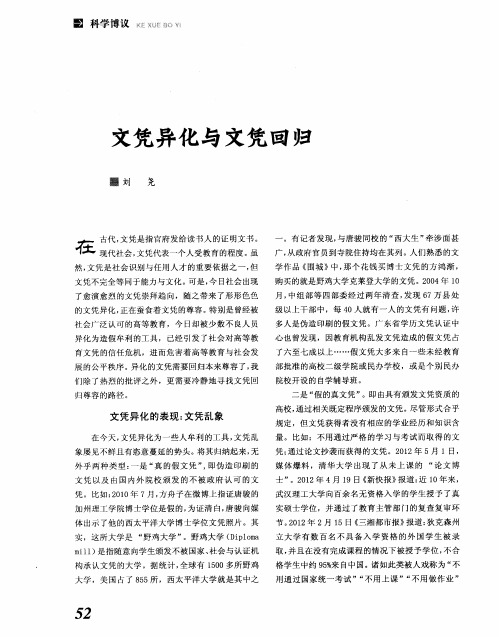
心 也曾发现 ,因教育机 构乱发文凭造成 的假 文凭 占
了六至七成 以上……假 文凭大多来 自一些 未经教育 部批准 的高校 二级学院或 民办学校 ,或 是个别 民办 院校 开设 的 自学辅导班 。
二 是 “ 的真 文 凭 ” 假 。即 由具 有 颁 发 文 凭 资 质 的
育文凭 的信任危机 ,进而危害着高等 教育与社会发
广, 从政府官员到寺院住持均在其列 。 人们熟悉的文 学 作品 《 围城 》中, 个花钱 买博士 文凭 的方鸿渐 , 那 购买 的就是野鸡大学克莱登大学 的文凭 。 0 4 1 20 年 0 月, 中组部 等 四部 委经过 两年清 查, 发现 6 7万县 处 级 以上干 部中,每 4 人就有 一人的文凭有 问题 , 0 许 多人是伪造 印刷 的假文 凭。广 东省学历文凭 认证 中
府官员、 企业 高 管 等 没 有 受 到 应 有 的 惩 罚 。 汉 理 工 武
国防部长古滕 贝格 , 以及 自民党 女政 治家、 欧洲议会
大学 “ 廊坊班 ” 授予的真 的假文凭 , 也未见教育主管
议员 、 欧洲 自由与 民主党联盟副主席 梅林 , 因博士 均
论文抄袭而辞职, 结束 了政 治生涯 。 诸如此类 真的假 文凭乱象层出不穷。
凭 。 比如 :0 0年 7月 , 舟 子 在 微 博 上 指 证 唐 骏 的 21 方
高校 , 通过相关 既定程序颁 发的文凭 。 尽管形式合乎
规定,但 文凭获得者没 有相应 的学业经 历和知识含 量 。比如 :不用通过严 格的学 习与考试 而取得 的文 凭; 通过 论文抄袭而获得 的文凭 。2 1 年 5月 1日, 02 媒体 爆料 ,清 华大 学 出现 了从未 上课 的 “ 文博 论 士 ” 0 2 4月 1 。2 1 年 9日 《 新快报》 报道: 1 年来 , 近 0 武汉理工大学向百余名无资格入学 的学生授予 了真 实硕士学位 ,并通过 了教育主管部 门的复查复审环 节 。02 2 1 2 1 年 月 5日 《 三湘都 市报 》 道: 报 狄克森 州 立大 学有 数 百名不 具 备入 学 资格 的外 国学生 被录 取, 并且在没有完成课程 的情况下被授 予学位 , 不合 格学生 中约 9% 自中国。诸如此类被人戏称 为 “ 5来 不 用通过 国家统一考试 ”“ 不用上课 ”“ 不用 做作业 ”
在美国上野鸡大学

在美国上野鸡大学作者:兰月涛涛来源:《蓝盾》2010年第12期前不久,“打工皇帝”唐骏被“学历门”闹得灰头土脸,这不禁也让人们开始以质疑的目光审视以往风光无限的“海归”,他们是在哪所学校镀的金?留学文凭的含金量究竟有多少?据悉,除了唐骏资历中所提到的“西太平洋大学”是一所典型的野鸡大学外,如今在美国诸如此类的大学或学院多如牛毛,它们非但迷惑了不少国外求学者的目光,也吸引了不少美国本土学生作出错误的选择。
野鸡大学,是指虽然是合法机构,但不被所在国社会、用人企业认可的学校。
他们随便向学生发出的证书、文凭并不被主流企业或教育机构承认。
此类院校又被称为“文凭工厂”。
这类“文凭工厂”何以如此嚣张?能在美国这样的留学大国大行其道?曾赴美求学的上海女孩兰月一,近日接受了作者的专访。
她将自己误入野鸡大学的经历和鉴别“文凭工厂”的方法和盘托出。
随着教育国际化的发展,兰月一希望自己的经历对更多正打算出国求学的人能有所帮助,同时也让更多国人了解这些野鸡大学的幕后。
误入野鸡大学2001年,我决定申请赴美留学,以提高自己在网络编程方面的能力。
经过托福考试,还有国内老师的推荐,我向五所美国大学递交了就读申请,忐忑地等待命运的裁决。
当年3月,我接到了署名“汉密尔顿大学”的通知书,全家人都很激动。
我按照通知上的电话回复确认了消息,告知校方我会准时前往报到,之后便开始了紧张有序的出国准备。
临走前的一个月,我每天都在购买出国用品,见亲戚朋友。
要知道,汉密尔顿大学是美国的知名学府,计算机专业处于各高校同专业领军水准,连克林顿都以得到该校名誉教授头衔而自豪。
终于,按通知书上的地址,我来到怀俄明州埃文斯顿。
办理完入学手续,我被告知需在当地的居民家里寄宿。
开课前,我简单地熟悉了校园:只有4栋上了年头的两层办公楼,以及前后8座6层教学楼。
这让我有些失望,身为名校,怎么这么寒酸?不过,想起曾有留学经历的朋友说过,国外大学的硬件相对寒酸,加利福尼亚大学这样世界排名前三十的学校,每年只招收3600名学生,根本不需要太大的校园,他说:“大学之大,不在于大楼,而在于大师。
为什么文凭打不到唐骏

为什么文凭打不到唐骏作者:转自和菜头来源:《北方人》2010年第09期这几天在唐骏博士文凭上的纠缠实在是一件可悲的事情,因为这个细节实在是无关大局。
唐骏究竟是美国西太平洋大学的博士,还是加州理工大学的计算机系博士,本来不应该是问题的焦点。
问题的焦点在于:为什么多年来各种吹牛逼撒大谎的家伙总有市场,总会被炮制为神话?从意念可以致偏导弹、大兴安岭灭火的严新老师,到凭着一张嘴要炸开喜马拉雅山让高原变绿洲的牟其中老师,再到大家都非常熟悉的洪志老师——按照他的话说,许多佛为了爬上来看他一眼,都掉下去摔死了。
更别说芒硝治百病的蒙古大夫,拍摄年画华南虎的农民,以及刚刚穿了帮的绿豆万能大夫……过去的这几十年间,是一个各种牛逼犯层出不穷、风起云涌的时代。
也是各种投机专家和机会主义者呼风唤雨、颠倒众生的时代。
如果我们公平地说,唐骏老师在这一群牛逼犯里,算得上干货较多的一位。
回顾往昔,比尔·盖茨未必盛情邀请他留任,但是唐骏的确充任过当时还很弱小的微软中国区总裁。
假若重来,陈天桥未必还会认定在盛大上市的关口需要这么一位人物,但是唐骏的确出任过盛大的总裁。
而说到现在,唐骏也真是货真价实的新华都集团总裁兼CEO,哪怕工资并非他所说的年薪10亿。
按照今时今日的标准,唐骏也算得上是商业社会里的一位成功人士,起码他一直步步高升,没有越做越小。
职业人的梦想,还能比这样更多么?承认这一点,就应该醒悟一件事情:文凭并不是唐骏博士的命门。
中国人奉行严格的现实主义,拿西太平洋大学文凭还是拿加州理工大学的文凭,并不影响大众对唐骏成功的定位。
老实说,拿西太平洋大学的文凭还要更好一点,如果根本没有文凭那简直堪称完美——中国人喜欢说一句话:英雄莫问出处。
在一个大部分国民都没有大学毕业文凭的国度里,在一个处处都因为文凭而影响就业的国度里,一个文盲英雄会被大部分的国民引为知己同路。
当知识精英阶层越是在这个问题上进行打击,这位文盲英雄的群众基础也就越是稳固,越是受到民众的欢迎。
唐骏中心领导力解读

唐骏中心领导力解读唐骏领导力之一:黑夜给了我黑色的眼睛,我却用他来查找光明!这是唐骏的官方简历,沉甸甸的,一方面专门多在外企工作的职业经理人,会从那个简历中看出自己的影子;另一方面,可能也不免有些遗憾,因为对比唐骏,更多的人没有选择在关键点上的奋力一跳,这不光因为唐骏的机遇好,更关键的是,唐骏在抓住机遇层面的领导力:为机遇做好了十足预备,同时,敢于抓住机遇而没有犹疑!当年从北京邮电学院走出的人专门多,但能够去日本、美国留学的不多;当年学习信号专业的有些学生专门多,但能够发明卡拉OK计分器的人专门少;在日本获得博士学位的人专门多,但为了更好的以后,选择舍弃博士学位从美国从头开始的人专门少。
这确实是唐骏,当我们艳羡的时候,我们有没有咨询过自己:在面对机遇的时候,你有没有做好预备?别人在为机遇预备的时候,你有没有嘲笑过别人傻?在机遇到来的时候,你敢不敢放下差不多获得成就奋力一跳?不管你同意不同意,大部分人都成为不了唐骏,因为在这些咨询题的咨询答中,差不多注定了唐骏的成功,这确实是唐骏用职业奋斗来演绎给我们的机遇领导力,这在第一领导力中心的领导力思维中,属于价值观领导力的一部分,选择什么就收成什么。
第二:心态领导力:面对同样的咨询题,你选择消极应对,你获得了大多是苦闷;你选择主动主动,你获得是激情成就妄图,这确实是心态领导力!和那个年代大多数家庭一样,唐骏的父亲为了今后小孩的婚姻大事,盖起了房子,这是一笔在当年看来庞大的开销。
家里不仅需要省吃俭用,而且在建筑材料上也需要“花最小的钞票,拿最多的料”,例如黄沙,因此唐骏和他哥哥去搬运黄沙,那时候的价格是4块钞票一吨。
买黄沙颇有讲究,因为这一吨是按十板车运算的。
装运时,到底是平平的一车,依旧堆得高高的一车,实际重量大为不同。
卖黄沙的地点有两个人,一个是看门的大爷,另一个是开票员。
开票员通常收完钞票开好票就走开了,负责监督她们装运的是看门人。
唐骏的哥哥比较害羞,不敢也不愿和别人讲话,这搞关系的任务就落到了唐骏的头上。
唐骏
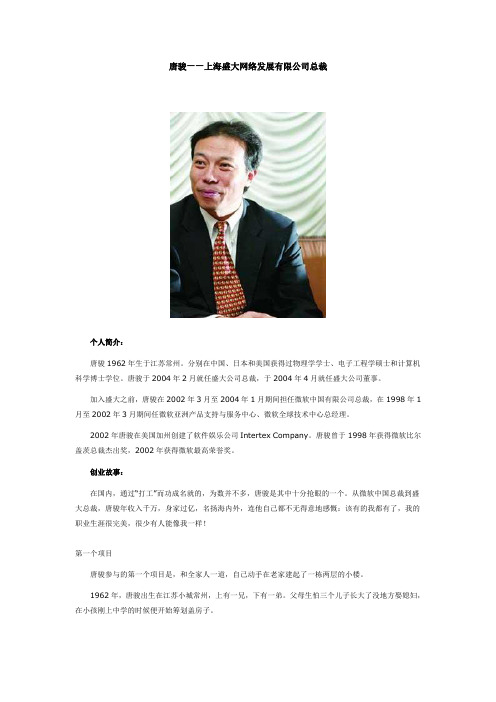
唐骏——上海盛大网络发展有限公司总裁个人简介:唐骏1962年生于江苏常州。
分别在中国、日本和美国获得过物理学学士、电子工程学硕士和计算机科学博士学位。
唐骏于2004年2月就任盛大公司总裁,于2004年4月就任盛大公司董事。
加入盛大之前,唐骏在2002年3月至2004年1月期间担任微软中国有限公司总裁,在1998年1月至2002年3月期间任微软亚洲产品支持与服务中心、微软全球技术中心总经理。
2002年唐骏在美国加州创建了软件娱乐公司Intertex Company。
唐骏曾于1998年获得微软比尔盖茨总裁杰出奖,2002年获得微软最高荣誉奖。
创业故事:在国内,通过“打工”而功成名就的,为数并不多,唐骏是其中十分抢眼的一个。
从微软中国总裁到盛大总裁,唐骏年收入千万,身家过亿,名扬海内外,连他自己都不无得意地感慨:该有的我都有了,我的职业生涯很完美,很少有人能像我一样!第一个项目唐骏参与的第一个项目是,和全家人一道,自己动手在老家建起了一栋两层的小楼。
1962年,唐骏出生在江苏小城常州,上有一兄,下有一弟。
父母生怕三个儿子长大了没地方娶媳妇,在小孩刚上中学的时候便开始筹划盖房子。
唐骏12岁上了初中,家里的工程也正式开始。
“从初一到初二,整整两年时间,我基本没去上学,都在家里当童工盖房子。
”唐骏回忆,那段日子很苦,房子所需要的几乎所有材料,都是兄弟几个四处采集而来的。
“初二期末考试,拿了二十几分,好在那时候文革,大家都不念书,初三回到学校补上来,很快便变成第一了。
”这第一个巨大工程,也变成了今天唐骏对少年时期最深刻的记忆。
“现在房子还在呢,非常结实!”房子最终没有派上用场。
1980年,唐骏考上了北京邮电大学。
在当时,北邮还没像今天这么热门,唐骏第一志愿报的是复旦物理系,谁也没想到平时语文成绩挺好的唐骏,高考时居然拿了个59分,总分虽然过了,但复旦在这一年开始规定:任何一门不及格者不予录取!“问题出在作文上,要求是写一篇议论文,我给写成了记叙文了,那年作文占40分,估计损失了不少分数。
美国西太平洋大学唐骏博士的中国校友录.

美国西太平洋大学唐骏博士的中国校友录美国西太平洋大学中国校友录编者按:1唐骏博士的成功可以复制,但无法粘贴。
2唐骏博士的学历很好复制,而且价格很低!3是金子总会发光的,是骗子总会被曝光的。
4不怕神一样的对手,就怕猪一样的校友。
田春女威尔特科技发展有限公司总经理助理陈亦佳女中国文联公务员陈慧凯男监察部干部杨贵生男北京市惠诚律师事务所张钧男清华同方企划主管鲁志红女北京城建五建设工程有限公司技术邱景文男西门子(中国)有限公司商务赵梅女西门子商务陈思男北京诺华制药有限公司杜倩女北京中北商标专利事务所王正男北京中北商标专利事务所李伦哲男金靓女广州南新制药有限公司注册经理吴阳女亚商在线政府关系专员陈茂良男国防科技信息中心宋芳女武桔女张索鑫女北京钟表工业专营公司文员安江南男中国航天科技集团何雅琼女北京盛世恒丰贸易有限公司郭柳燕女高弘轶男焦志亮男吕岩女中国国际经济贸易仲裁委员会秘书刘传芳女朝阳区豆各庄乡人民政府科员刘勇男海军装备研究院翻译吴莎莎女北大国际医院投资管理有限公司董事长秘书吴艳云女北京电力公司经理办主任曹斌男北京市公安局东城分局科员尚徽男北京市公安局东城分局民警白保玉男北京市民政局科员熊晓颖女天睿律师事务所律师助理陶涛男中国建筑设计研究院工程师包瓴瓴女全国人大信息中心欧欢欢女骆宇男大兴区地方税务局科员孙雅楠女北京市司法局科员于庆华女尹凌女汪爱君男北京市尚公律所律师李燕霞女中国银行丰台芳星园支行彭鹏男中国民用航空总局科员杨琳琳女Motorola张凤女中国水利电力物资有限公司职员张燕云女北京市计算机工业学校教师黎人凤女黄伟男北京国体世纪体育用品认证公司审核员马宏涛男卢欣男工行北京分行副科长李晓芳女北京市商标专利事务所律师蔡正平女北京市公证员协会职员王晓涛男中国经济导报社编辑董珅女北京世纪安泰建筑工程设计有限公司经营部经理谷川男北京市外地罪犯遣送处科员斯然女北京市热力集团热源分公司刘伟宁男卫生部保健局主任科员宋红辉女中国劳动关系学院教师黄一谷男华农财产保险股分有限公司钟民男史运德男北京市门头沟区司法局赵楠男农业银行宣武支行成事吉分理处刘静女北京市朝阳区人民检察院李强男中关村建设奥运篮球馆总承包部喻小玲女张薇女中建二局王鹏女张楠女石慧杰男北京长安律师事务所律师贾濛女胡海涛男北京市版权局姜涛男北京中创律师事务所律师毕敏女朱晓波男侯韩芳女中国标准化研究院吕建波男马宪女李鹏女壳牌(中国)有限公司董事会秘书郄俊珺女张昕女北京政法管理干部学院采编苑芳女中华女子学院法律系寇向卉女北京尚公律师事务所律师张发靖男法律出版社经理陈吴阳子女普天太力郭琳女中华女子学院法律系办公室教学秘书李岩男最高人民法院王振泉男山东兰田集团法律部高岩女武云溥男新浪网编辑林信成男北京作家协会艺术家作家陈爱如女王博男专利局科员郑丽珍女张晖女中国航天科工集团谢芳女宋宇男张建新女默沙东中国有限公司行政主任马红科女北京金色窠间房地产经纪公司副总游涛男邱祎杰女中关村知识产权促进局职员柳金辉男执行董事黄惠女北京市宝鼎律师务所律师李会征男北京市药品监督管理房山分局科员张祖瑜女崇文法院科员李佳新女中伦金通律所法助何睿男北京市民政局殡葬管理处科员赵彦波男亚宝集团北京办事处职员陈明刚男总经理杨华女天则经济研究所助理刘宜萍女中国原子能研究院北京埃索特公司陈凯男中凯律师事务所律师张婧房芳女蔡概还男银监会胡晓燕女新世纪国际租赁有限公司项目经理陈贝贝女中央电视台编导王宇女联美投资有限公司董秘罗曈女北京亚格南科贸有限公司经理助理张海遥通州法院助理审判员原海涛通州法院法官林岚程艳红女对外经济贸易大学杨迪女工商宣武分局科员曹慧明女李佩芫女环球之旅杂志社记者郝爱群女张帆女首都心科研究所李晓红女北京市逢时律师事务所律师王珊珊女中北商标专利事务所张琴女中证副总经理商靓女国家商务部科员李琦女北京银龙知识产权代理有限公司王芳女北京市政府采购中心付晓辉男中国贸促会刘玉梅女北京市民政局副科长王昕女中央电视台编导刘康男中共中央对外宣传小组办公室干事杨兴惠女三月风律师事务所律师张林鹏男国药集团中国医疗器械公司职员岳雷男林扬女北京市地方税务局稽查庄越明女律师邓旭男中国日出集团总裁刘毅男北京大学医学部副研究员朱容男安盛药业有限公司北京办经理野永东男中国电信系统集成公司副总经理王臣男钢铁研究总院副院长徐若钢男钢铁研究总院院长助理李正大男利是集团董事长王坚男北京首都旅游股份公司董事副总裁杨成功男北京中交星网宽频网络服务有限公司首席执行官张勇男江苏省电子商务公司总裁李瑛女深圳法制报社秘书长刘如玲男北京和敬商社总经理肖斌男北京大开明经济贸易发展中心总经理蓝海男中国国旅贸易有限公司董事长陈海燕男中国少年儿童新闻出版总社总经理禹晋永男北京凯爱投资有限公司董事长薛英女北京星豹广告有限公司董事长叶丹女上海美恩生物技术有限公司董事长时彪男辽宁卫星生物制品研究所(有限公司)董事长王景京男味元饲料有限公司总经理冯晶男北京安盟投资策划有限公司董事长杨建伟男中国北海宇丰经济实业发展公司副总经理赵然男北京迪玛科技有限公司董事长郭志伟男北京信捷通移动通信技术有限责任公司常务副总张永全男北京普贤德隆投资顾问有限公司总经理邵佩民男中国国旅贸易有限公司副总裁王德忠男吉林天三奇实业集团副总经理武红女中国科学院科技物资中心财务主任周世锋男北京正平律师所律师李群先男北京远大创世国际贸易有限责任公司副总经理王京文女北京远大创世国际贸易有限责任公司总经理张金澎男北京宾阳建筑集团第三建筑工程公司总经理姜涛男连云港石港高压电瓷有限公司副总经理刘青男全国科技名词委员会办公室主任蔡明男罗旭华女北京旅游学院系主任邓海靖男天同证券有限责任公司副总王彦权男吉林省烟草专卖局高级经济师王力工男志阳汽车电气有限公司总经理王新文男河南北方通讯工程公司董事长王京城男美国ExperExchange.Inc 副总裁吴刚男沈阳东大迪克化工药业有限公司董事长胡志超男济南天一印务有限公司总经理杜淑英女青海三江源集团四宁建筑装潢有限公司总经理于炼男中机电集团董事长包天华男重庆良华房地产董事长崔长青男北京化学工业集团进出口公司经理叶军男北京招润投资公司总经理李枫秋女清华大学CIMS中心咨询顾问濮春干男天津梅塞尔凯德气体系统总经理蒋实刚男盘锦正和有限公司总经理郭津迎女北京工商管理学院院办主任。
西太平洋博士.
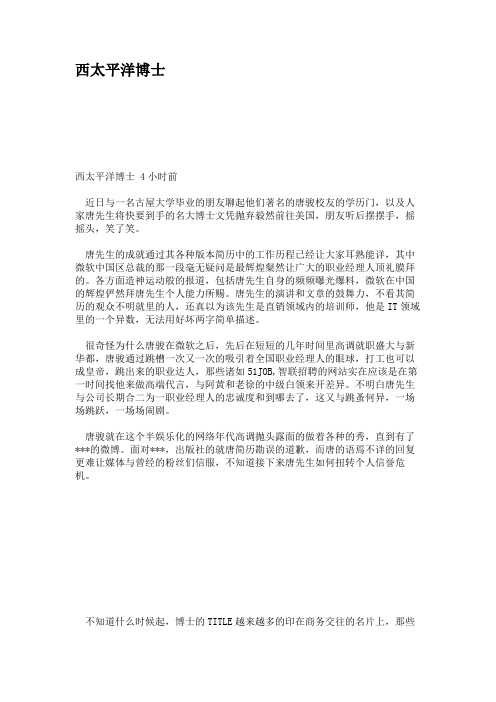
西太平洋博士西太平洋博士 4小时前近日与一名古屋大学毕业的朋友聊起他们著名的唐骏校友的学历门,以及人家唐先生将快要到手的名大博士文凭抛弃毅然前往美国,朋友听后摆摆手,摇摇头,笑了笑。
唐先生的成就通过其各种版本简历中的工作历程已经让大家耳熟能详,其中微软中国区总裁的那一段毫无疑问是最辉煌粲然让广大的职业经理人顶礼膜拜的。
各方面造神运动般的报道,包括唐先生自身的频频曝光爆料,微软在中国的辉煌俨然拜唐先生个人能力所赐。
唐先生的演讲和文章的鼓舞力,不看其简历的观众不明就里的人,还真以为该先生是直销领域内的培训师,他是IT领域里的一个异数,无法用好坏两字简单描述。
很奇怪为什么唐骏在微软之后,先后在短短的几年时间里高调就职盛大与新华都,唐骏通过跳槽一次又一次的吸引着全国职业经理人的眼球,打工也可以成皇帝,跳出来的职业达人,那些诸如51JOB,智联招聘的网站实在应该是在第一时间找他来做高端代言,与阿黄和老徐的中级白领来开差异。
不明白唐先生与公司长期合二为一职业经理人的忠诚度和到哪去了,这又与跳蚤何异,一场场跳跃,一场场闹剧。
唐骏就在这个半娱乐化的网络年代高调抛头露面的做着各种的秀,直到有了***的微博。
面对***,出版社的就唐简历勘误的道歉,而唐的语焉不详的回复更难让媒体与曾经的粉丝们信服,不知道接下来唐先生如何扭转个人信誉危机。
不知道什么时候起,博士的TITLE越来越多的印在商务交往的名片上,那些怎么看都不像的人怎么的都叫人郁闷,英文们不见有我高,中文我还比他写的更煽情,专业探讨我还负责业务内名词的的释疑。
都说扩招了,可毕竟博士也是需要时间和考试读出来的,有了唐先生西太平洋的案例,这一个多年的疑问下了心头。
苏丹红,二恶因,三聚氰胺,西太大,荒唐的事情已经够多够添堵了,那些西太大的博士们该收场了!。
唐骏的文凭与不做明星的企业家
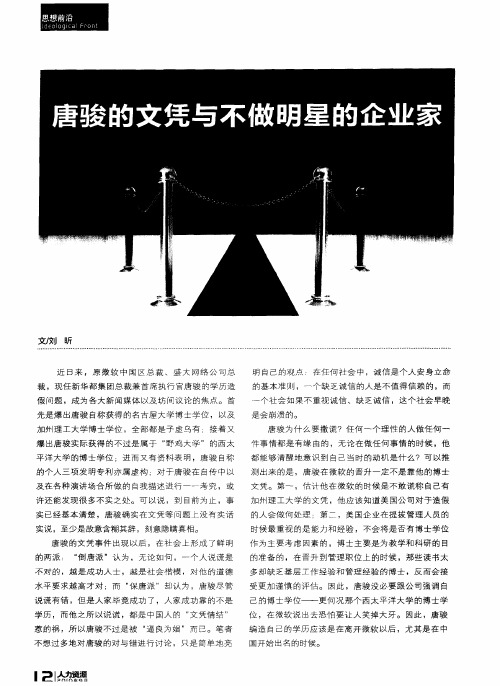
I I 己
.
那 么 ,既然 唐 骏从 微 软 出来看 上 去 已经 很 成 功 , 为 什 么 反 而 开 始 造 假 呢 ? 一 个 可 以 推 测 的 理 由 是 ,他
下 的 “ 员” ,他 们就 不 可避 免 地会 因为考 虑 个人 形 演
象 以 及 大 众 的 看 法 , 而 去 迁 就 甚 至 迎 合 外 界 的 各 种 不
假 问 题 ,成 为 各 大 新 闻 媒 体 以 及 坊 间 议 论 的 焦 点 。 首
个 社 会 如 果 不 重 视 诚 信 、 缺 乏 诚 信 ,这 个 社 会 早 晚
先是 爆 出唐骏 自称获 得 的名 古屋 大学 博 士学位 ,以及 加州 理 工大 学博 士学位 ,全部 都是 子 虚 乌有 i接 着 又 爆 出唐骏 实际 获得 的不 过 是属 于 “ 野鸡 大 学 ”的西 太 平 洋大 学 的博 士学位 ;进而 又 有资 料表 明 ,唐骏 自称
恰 当的 需求 。 想想 深 圳华 为 技术 有 限公 司 的总 裁任 正
非 , 尽 管 他 所 领 导 的 企 业 快 速 成 长 ,备 受 各 界 关 注 ,
但 是 他本 人 多 年来 却 非 常低 调 ,一直 刻 意躲 开 媒体 ,
不 做 明 星 , 恐 怕 也 正 是 出 于 这 方 面 的 考 虑 。 如 果 唐 骏
国开始 出名 的时候 。
说 谎 有错 ,但 是人 家毕 竟 成功 了 ,人 家成 功靠 的不 是
学 历 ,而 他 之 所 以说 谎 ,都 是 中 国 人 的 “ 凭 情 结 ” 文
惹 的祸 ,所 以唐 骏不 过是 被 “ 良为 娼 ”而 已。 笔者 逼 不想 过 多地 对唐骏 的 对 与错进 行 讨论 ,只 是 简单 地亮
- 1、下载文档前请自行甄别文档内容的完整性,平台不提供额外的编辑、内容补充、找答案等附加服务。
- 2、"仅部分预览"的文档,不可在线预览部分如存在完整性等问题,可反馈申请退款(可完整预览的文档不适用该条件!)。
- 3、如文档侵犯您的权益,请联系客服反馈,我们会尽快为您处理(人工客服工作时间:9:00-18:30)。
GAO United States General Accounting OfficeTestimonyBefore the Committee on Governmental Affairs, U.S.SenateDIPLOMA MILLSFor Release on DeliveryExpected at 10:00a.m. EDTTuesday, May 11, 2004Federal Employees HaveObtained Degrees fromDiploma Mills and OtherUnaccredited Schools,Some at GovernmentExpenseStatement of Robert J. Cramer,Managing Director Office of Special InvestigationsaMadam Chairman and Members of the Committee:I am pleased to be here today to discuss issues related to degrees from “diploma mills” and other unaccredited postsecondary schools. As you requested, we conducted an investigation to determine whether the federal government has paid for degrees from diploma mills and other unaccredited postsecondary schools. Section 4107 of title 5, U. S. Code, only permits the federal government to pay for the cost of academic degree training provided by a college or university that is accredited by a nationally recognized accrediting body. You also asked us to determine whether federal employees who hold senior-level positions have degrees from diploma mills and other unaccredited schools. My testimony today summarizes our investigative findings.We conducted our investigation from July 2003 through February 2004, in accordance with quality standards for investigations as set forth by the President’s Council on Integrity and Efficiency. We searched the Internet for nontraditional, unaccredited, postsecondary schools that offer degrees for a relatively low flat fee, promote the award of academic credits based on life experience, and do not require any classroom instruction. We requested that four such schools provide information on the number of current and former students identified in their records as federal employees and payment of fees for such federal employees by the federal government. In addition, posing as a prospective student who is employed by a federal agency, our investigator contacted three unaccredited schools to obtain information on how he might have a federal agency pay for a degree.Additionally, we requested that eight federal agencies—the Departments of Education (ED), Energy (DOE), Health and Human Services (HHS), Homeland Security (DHS), Transportation (DOT), and Veterans Affairs (VA); the Small Business Administration (SBA), and the Office of Personnel Management (OPM)—provide us with a list of senior employees, level GS-15 (or equivalent) or higher, and the names of any postsecondary institutions from which such employees had reported receiving degrees. We compared the names of the schools on the lists provided by these agencies with those that are accredited by accrediting bodies recognized by the Department of Education. We also requested that the agencies examine their financial records to determine if they had paid for degrees from unaccredited schools, and we interviewed six federal employees who have obtained degrees from unaccredited schools.Summary In summary, 3 of the 4 unaccredited schools responded to our requests forinformation and provided records that identified 463 students employed bythe federal government. Two of the four schools provided records thatfederal agencies paid them $150,387.80 for the fees of federal employeestudents. In addition, DOE and DOT advised us of separate paymentstotaling $19,082.94 for expenses associated with degrees from these twoschools, for total federal payments of $169,470.74 to them. However, forthe reasons explained below, the records provided by the schools andagencies likely understate the extent of federal payments for degrees atdiploma mills and other unaccredited schools.Data provided by 8 agencies indicated that 28 senior-level employees havedegrees from diploma mills and other unaccredited schools. In our follow-up interviews with six of these employees and their managers, we weretold that experience, rather than educational credentials, was considered inhiring and promotion decisions concerning these employees. Again,however, for reasons set forth below, this number is believed to be anunderstatement of the actual number of employees at these 8 agencies whohave degrees from diploma mills and other unaccredited schools.Background The Homeland Security Act amended section 4107 of title 5, U. S. Code, byallowing federal reimbursement for degrees only from accreditedinstitutions. Specifically, section 4107 states that an agency may “pay orreimburse the costs of academic degree training … if such training … isaccredited and is provided by a college or university that is accredited by anationally recognized body.” (Emphasis supplied). For purposes of thisprovision, a “nationally recognized body” is a regional, national, orinternational accrediting organization recognized by the Department ofEducation.1 Because the law governs only academic degree training, itdoes not preclude an agency from paying for the costs of individual trainingcourses offered by unaccredited institutions. Prior to the enactment of theHomeland Security Act, federal agencies were not authorized to pay foremployee academic degree training unless the head of the agencydetermined that it was necessary to assist in recruitment or retention of15 C.F.R. § 410.308(b).employees in occupations in which the government had a shortage of qualified personnel.2Accreditation of degree-granting institutions in the United States is a voluntary process. Unaccredited schools, and the quality of education they offer, vary significantly. At one end of the spectrum are schools that offer standard curricula traditionally found at accredited universities. Other schools, commonly referred to as diploma mills, sell academic degrees based upon life experience or substandard or negligible academic work. Some diploma mills require no academic work at all and merely sell degrees for a fee, such as those we discussed in our November 2002 report.3Records Produced by Agencies and Schools Understate Federal Payments for Degrees from Unaccredited Schools Several factors make it extremely difficult, if not impossible, to determine the extent of unauthorized federal payments for degrees issued by unaccredited schools. First, the data we received from both schools and federal agencies understate the extent to which the federal government has made such payments. Additionally, the way in which some agencies maintain records of payments for employee education makes such information inaccessible. For example, HHS responded to our request for records of employee education payments by informing us that it could not produce them because it maintains a large volume of such records in five different accounting systems, has no way to differentiate academic degree training from other training, and does not know whether payments for training made through credit cards are captured in its training payment records.Moreover, diploma mills and other unaccredited schools modify their billing practices so students can obtain payments for degrees by the federal government. Purporting to be a prospective student, our investigator placed telephone calls to three schools that award academic credits based on life experience and require no classroom instruction: Barrington University (Mobile, Alabama); Lacrosse University (Bay St. Louis, Mississippi); and Pacific Western University (Los Angeles, California). These schools each charge a flat fee for a degree. For example, fees for25 U.S.C. 4107(a) and (b).3U.S. General Accounting Office, Purchases of Degrees from Diploma Mills, GAO-03-269R (Washington, D.C.: Nov. 21, 2002).degrees for domestic students at Pacific Western University are as follows: Bachelor of Science ($2,295); Master’s Degree in Business Administration ($2,395); and PhD ($2,595). School representatives emphasized to our undercover investigator that they are not in the business of providing, and do not permit students to enroll for, individual courses or training. Instead, the schools market and require payment for degrees on a flat-fee basis. However, representatives of each school told our undercover investigator that they would structure their charges in order to facilitate payment by the federal government. Each agreed to divide the degree fee by the number of courses a student was required to take, thereby creating a series of payments as if a per course fee were charged. All of the school representatives stated that students at their respective schools had secured payment for their degrees by the federal government.Information we obtained from two unaccredited schools confirms that the federal government has paid for degrees at those schools. We asked four such schools that charge a flat fee for degrees to provide records of federal payments for student fees: California Coast University (Santa Ana, California); Hamilton University (Evanston, Wyoming); Pacific Western University (Los Angeles, California); and Kennedy-Western University (Thousand Oaks, California). Hamilton University failed to respond to our request. Pacific Western University reported that it could not locate any records indicating that federal payments were made, although this claim directly contradicts representations made to our undercover investigator by a school representative that federal agencies had paid for degrees obtained by Pacific Western University students.Pacific Western University, California Coast University, and Kennedy-Western University provided data indicating that 463 of their students were federal employees. California Coast University and Kennedy-Western University provided records indicating that they had received $150,387.80 from federal agencies for 14 California Coast University students and 50 Kennedy-Western University students. The information is summarized in table 1.Table 1: Federal Employees and Payments Associated with Unaccredited Schools Source: GAO analysis of data received from Kennedy-Western University, California Coast University, and Pacific Western University.a These numbers represent information provided by three schools—Kennedy-Western University, California Coast University, and Pacific Western University.Department or agency Number of students identifiedas federal employees aNumber of federal employees for whom tuition payments were made b Total tuition payments made by federal agencies b Energy 353$13,505.00Transportation 17Homeland Security 12Health and Human Services 114$8,175.00Veterans Affairs 135$12,535.00Office of Personnel Management 1Education 2Defense 25728$68,248.05US Postal Service 298$24,970.00Agriculture 51$1,500.00US Courts 2US Agency for Int’l. Development 1Treasury 81$2,050.00State 3Peace Corps 1National Aeronautics & Space Admin. 92$2,131.25General Services Admin.31$600.00Federal Reserve Bank 1Federal Deposit Insurance Corp.2Federal Communications Commission 1Environmental Protection Agency 92$5,538.00Labor 11$2,437.50Justice 135$5,458.00Interior 6Commerce 4Unspecified 173$3,240.00Total 46364$150,387.80b These payments represent limited information provided from two schools—Kennedy-Western University and California Coast University.After identifying federal agencies that made payments to Kennedy-Western and California Coast, we requested that DOE, HHS, and DOT provide records of their education-related payments to schools for employees during the last 5 years. As previously discussed, HHS advised us that it could not provide the data. DOE and DOT provided data that identified payments of $19,082.94, which were in addition to those reflected in table 1, for expenses associated with Kennedy-Western. Thus, we found a total of $169,470.74 in federal payments to these two unaccredited schools. However, a comparison of the data received from the schools with the information provided by DOE and DOT shows that the schools and the agencies have likely understated federal payments. For example, Kennedy-Western reported total payments of $13,505 from DOE for three students, while DOE reported total payments of $14,532 to Kennedy-Western for three different students. Thus, DOE made payments of at least $28,037 to Kennedy-Western. Additionally, DOT reported payments of $4,550 to Kennedy-Western for one student, but Kennedy-Western did not report receiving any money from DOT for that student.4Senior-Level Federal Employees Have Degrees from Unaccredited Schools On the basis of the information we obtained from eight agencies, we determined that some senior-level employees obtained degrees from diploma mills and other unaccredited schools. Specifically, we requested that eight agencies review the personnel folders of GS-15 (or equivalent) and above employees and provide us with the names of the postsecondary institutions from which such employees reported receiving academic degrees. The eight agencies were: ED, DOE, HHS, DHS, DOT, VA, SBA, and OPM. The agencies informed us that their examination of personnel records revealed that 28 employees listed degrees from unaccredited schools; and 1 employee received tuition reimbursement of $1,787.44 in connection with a degree from such a school.However, we believe that this number understates the number of federal employees at these agencies who have such degrees. The agencies’ ability to identify degrees from unaccredited schools is limited by a number of4Our investigation was limited to direct federal payments to schools and did not include federal reimbursements of school fees to employees.factors. First, diploma mills frequently use names similar to those used by accredited schools, which often allows the diploma mills to be mistaken for accredited schools. For example, Hamilton University of Evanston, Wyoming, which is not accredited by an accrediting body recognized by ED, has a name similar to Hamilton College, a fully accredited school in Clinton, New York. Moreover, federal agencies told us that employee records may contain incomplete or misspelled school names without addresses. Thus, an employee’s records may reflect a bachelor’s degree from Hamilton, but the records do not indicate whether the degree is from Hamilton University, the unaccredited school, or Hamilton College, the accredited institution. Further, we learned that there are no uniform verification practices throughout the government whereby agencies can obtain information and conduct effective queries on schools and their accreditation status. Additionally, some agencies provided information about only the most recent degrees that employees reported receiving. We interviewed several federal employees who had reported receiving degrees from unaccredited schools. These employees included three management-level DOE employees who have emergency operations responsibilities at the National Nuclear Security Administration (NNSA) and security clearances. We also found one employee in the Senior Executive Service at DOT and another at DHS who received degrees from unaccredited schools for negligible work. Additional details of their interviews are provided below.Employees #1, #2, and #3 are managers in the Office of Emergency Operations at NNSA and have “Q” level security clearances. Employee #1, who was hired at NNSA in 2002, paid $5,000 for a masters degree in 1996 from LaSalle University, an unaccredited school that has been found to have made false claims of accreditation.5 This individual obtained the degree in 1996 while in the Air Force in order to advance his career. He informed us that while serving as a Lieutenant Colonel in the Air Force, he was told that he would need a master’s degree in order to be considered for promotion to colonel. He contacted LaSalle University and obtained a degree based on life experience, courses he had taken previously in the military, and courses for which he read books and wrote papers. Employee #1 told us that he did not attend classes or take any tests, his master’s5Four individuals were convicted in the Eastern District of Louisiana for mail fraud, wire fraud, and money laundering in connection with their operation of LaSalle University.degree from LaSalle was a “joke,” and he received it after paying approximately $5,000.Employee #2, hired at NNSA in 2000, received a bachelor’s degree in 1992 from Chadwick University, an unaccredited school. Employee #2 never attended classes but obtained the degree based on 30 credits for life experience, several college level examination program tests, and nine correspondence courses. The employee reported reading a book, writing a paper, and taking a final exam for each of the nine courses. This is the only postsecondary education this employee has obtained. Although agency personnel records indicate that this individual is a candidate for a master’s degree program at an unaccredited foreign school, Employee #2 has never completed any courses for such a degree.Employee #3, hired at NNSA in 2000, received a PhD in engineering administration in 1985 from Columbia Pacific University, an unaccredited school. He performed course work required for a PhD at George Washington University, a fully accredited school, but did not complete a dissertation. Employee #3 claims to have completed a dissertation for Columbia Pacific but did not attend classes or complete any coursework at that school. In December 1999, the Marin County Superior Court ordered Columbia Pacific University to cease operations within California. The court determined that Columbia Pacific failed to meet various requirements for issuing PhD degrees, awarded excessive credit based on life experience, and failed to employ duly qualified staff.Employee #4 is a Senior Executive Service official at DOT. Employee #4 received a Bachelor of Science degree within 6 to 8 months from Kent College, an unaccredited school. Kent waived some credits while Employee #4 completed three research papers and paid $3,500 for the degree. In 1992, Employee #4 listed the degree from Kent College on his application for a master’s degree program at an accredited school. Officials at the school to which he applied did not identify Kent as an unaccredited school with a history of awarding degrees based on negligible work. The accredited school accepted Employee #4 into its master’s program, and he completed it.Employee #5 was an employee in the Senior Executive Service at DHS at the time of our interview but has since resigned. This employee received a series of degrees based on negligible work from unaccredited Hamilton University while working at the Department of Labor (DOL) in various senior capacities. Between March and June 2000, this individual received abachelor’s and a master’s degree based on prior training and other life andwork experience. Subsequently, in March 2001, Employee #5 received aPhD in computer information systems from Hamilton. This individual leftDOL and began working at DHS in a Senior Executive Service position inApril 2003. A security clearance update, initiated while the employee wasstill at DOL but completed after the employee joined DHS, led to thediscovery of the degrees from Hamilton.Concluding Remarks In conclusion, the records that we obtained from schools and agencieslikely understate the extent to which the federal government has paid fordegrees from diploma mills and other unaccredited schools. Manyagencies have difficulty in providing reliable data because they do not havesystems in place to properly verify academic degrees or to detect fees fordegrees that are masked as fees for training courses. Additionally, theagency data we obtained likely do not reflect the true extent to whichsenior-level federal employees have diploma mill degrees. This is becausethe agencies do not sufficiently verify the degrees that employees claim tohave or the schools that issued the degrees, which is necessary to avoidconfusion caused by the similarity between the names of accreditedschools and the names assumed by diploma mills. Finally, we found thatthere are no uniform verification practices throughout the governmentwhereby agencies can obtain information and conduct effective queries onschools and their accreditation status.Madam Chairman, this concludes my prepared statement. I would be happyto respond to any questions that you or Members of the Committee mayhave.Contacts and Staff Acknowledgments For further information about this testimony, please contact Robert J. Cramer at (202) 512-7227; Andrew O’Connell at (202) 512-7449; or Paul Desaulniers at (202) 512-7435.GAO’s Mission The General Accounting Office, the audit, evaluation and investigative arm ofCongress, exists to support Congress in meeting its constitutional responsibilitiesand to help improve the performance and accountability of the federal governmentfor the American people. GAO examines the use of public funds; evaluates federalprograms and policies; and provides analyses, recommendations, and otherassistance to help Congress make informed oversight, policy, and fundingdecisions. GAO’s commitment to good government is reflected in its core values ofaccountability, integrity, and reliability.Obtaining Copies of GAO Reports and Testimony The fastest and easiest way to obtain copies of GAO documents at no cost is through the Internet. GAO’s Web site () contains abstracts and full-text files of current reports and testimony and an expanding archive of older products. The Web site features a search engine to help you locate documents using key words and phrases. You can print these documents in their entirety, including charts and other graphics.Each day, GAO issues a list of newly released reports, testimony, and correspondence. GAO posts this list, known as “Today’s Reports,” on its Web site daily. The list contains links to the full-text document files. To have GAO e-mail this list to you every afternoon, go to and select “Subscribe toe-mail alerts” under the “Order GAO Products” heading.Order by Mail or Phone The first copy of each printed report is free. Additional copies are $2 each. A checkor money order should be made out to the Superintendent of Documents. GAOalso accepts VISA and Mastercard. Orders for 100 or more copies mailed to a singleaddress are discounted 25 percent. Orders should be sent to:U.S. General Accounting Office441 G Street NW, Room LMWashington, D.C. 20548To order by Phone: Voice: (202) 512-6000TDD: (202) 512-2537Fax: (202) 512-6061To Report Fraud, Waste, and Abuse in Federal Programs Contact:Web site: /fraudnet/fraudnet.htmE-mail: fraudnet@Automated answering system: (800) 424-5454 or (202) 512-7470Public Affairs Jeff Nelligan, Managing Director, NelliganJ@ (202) 512-4800U.S. General Accounting Office, 441 G Street NW, Room 7149Washington, D.C. 20548United StatesGeneral Accounting Office Washington, D.C. 20548-0001Official BusinessPenalty for Private Use $300Address Service Requested Presorted Standard Postage & Fees PaidGAOPermit No. GI00。
